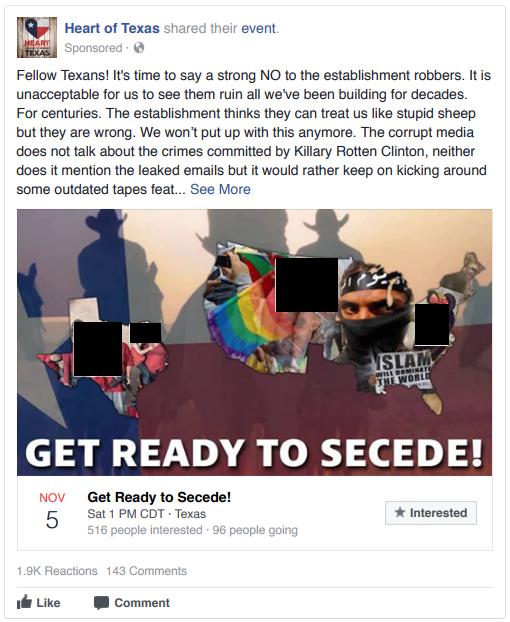Social Media Experts Say the Russian Trolls Suck at Facebook
Credit to Author: Louise Matsakis| Date: Fri, 03 Nov 2017 20:17:30 +0000
Russian trolls generally didn’t craft sophisticated Facebook and Instagram ads, according to VICE’s social media experts who reviewed the Kremlin-linked ads released this week.
The trolls didn’t use particularly advanced targeting techniques, and often didn’t optimize the content that they posted. The reason they were able to reach millions of Americans is not because they had some sort of meme magic, but because Facebook makes it incredibly easy to mico-target specific audiences.
Representatives from Google, Facebook, and Twitter testified at several open government hearings on Capitol Hill this week about how Russian-linked accounts used their platforms to influence the 2016 US presidential election. As part of the process, US lawmakers released over a dozen Facebook and Instagram ads on Wednesday believed to be connected to a Russian troll farm, as well as corresponding metrics, including how many people saw and interacted with the ads, how much they cost, and on what day they were posted.
The content of the ads varies widely: one promotes a Bernie Sanders coloring book, while another screams that it’s time for Texans to secede from the rest of the United States.
The ads released are a fraction of the 3,300 that Facebook identified as having been purchased by Russian-linked groups, including the notorious Russian Internet Research Agency, between June 2015 and August 2017.
Content from the Pages are believed to have reached over 120 million people, according to Facebook, while the ads themselves are said to have been viewed by over 10 million users.
“I’ve expressed how upset I am that the Russians tried to use our tools to sow mistrust. We build these tools to help people connect and bring us closer together,” Facebook’s CEO Mark Zuckerberg said in Facebook post earlier this week. “They used them to try to undermine our values. What they did is wrong and we’re not going to stand for it.”
Despite the fact that the Russian-linked ads released were seen by millions, social media experts at VICE’s own offices say that they were not particularly sophisticated posts, both in terms of their content and the way that they were targeted.

“They’re shitty, they’re not done super well,” Michael Bolen, VICE.com’s senior social editor told me. Bolen pointed to one of the most bizarre ads as an example of sloppy social media practices: a completely blacked-out Instagram ad, that looks like some kind of mistake.
Rachel Kelly, who handles social media advertising across VICE’s verticals, mentioned that many of the advertisements made a classic mistake: they have too much text on the photos. “That hurts your reach for Facebook advertising,” she explained. “The more text, the worse your post will perform.”
Some of the ads were fairly well-crafted. Like an August 2016 advertisement that advocated for Texas to secede. It was arguably one of the Russians’ most successful. It had a 24 percent “clickthrough rate” meaning 808 of the 3,361 people who saw the ad engaged with it in some way. For an online advertisement, that’s especially high engagement.
Bolen said if he were the Russians he would he have used more videos, since they tend to perform particularly well on Facebook. He mentioned that in the last couple of years, he’s seen tons of Facebook Pages plagiarize videos from across the internet and grow to over one million followers. He said he was surprised there weren’t more video posts included in the ads. It’s possible that there are many more videos in the over 3,000 ads Congress has yet to release.
Ultimately, Bolen and Kelly told me they had a lot of unanswerable questions about the Russian ads. For one, we don’t know what Facebook accounts were connected to the Pages that purchased the ads. We don’t know yet if they were real Russian people, or fake accounts.
“To set up a Page, you have to have actual people as the managers,” Bolen told me. “Those accounts, they’re supposed to be real people…creating a fake account and making it the account that manages a Page is really hard to do without getting your account blocked.”
It’s not clear whether the Russian trolls purchased the Facebook Pages they used, or built them organically. It’s possible the trolls bought several already-popular Pages and then repurposed them for propaganda. (Buying Pages is against Facebook’s Terms of Service.)
Another interesting question is whether the Russians made the content they posted themselves, or simply ripped it from preexisting accounts
“Did they write the text? Did they in some cases just straight copy other people’s posts?” Bolen asked. He said that he’s seen plenty of popular Facebook accounts that don’t make anything original themselves, and instead rely solely on plagiarized memes, videos, and other content to keep their Pages running.
Based on the information we have now, Kelly told me, it’s reasonable to conclude that the Russian trolls utilized Facebook’s already optimized advertising system. “Facebook makes it really easy to target whatever audience you’re interested in,” she said.
“If I wanted to influence an actual election, this isn’t what I would do,” Bolen told me. “They could have done better for sure. Though my mom would have done worse.”